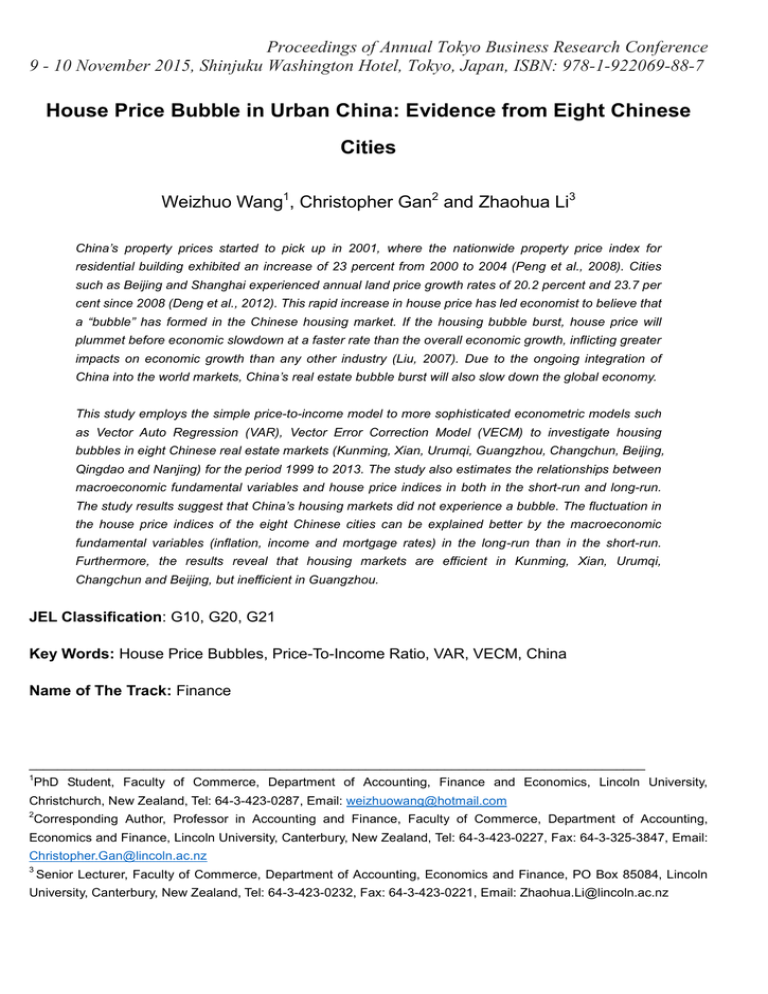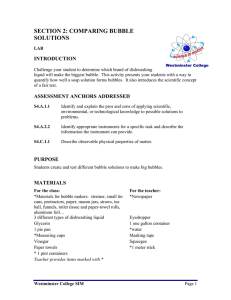Proceedings of Annual Tokyo Business Research Conference
advertisement

Proceedings of Annual Tokyo Business Research Conference 9 - 10 November 2015, Shinjuku Washington Hotel, Tokyo, Japan, ISBN: 978-1-922069-88-7 House Price Bubble in Urban China: Evidence from Eight Chinese Cities Weizhuo Wang1, Christopher Gan2 and Zhaohua Li3 China’s property prices started to pick up in 2001, where the nationwide property price index for residential building exhibited an increase of 23 percent from 2000 to 2004 (Peng et al., 2008). Cities such as Beijing and Shanghai experienced annual land price growth rates of 20.2 percent and 23.7 per cent since 2008 (Deng et al., 2012). This rapid increase in house price has led economist to believe that a “bubble” has formed in the Chinese housing market. If the housing bubble burst, house price will plummet before economic slowdown at a faster rate than the overall economic growth, inflicting greater impacts on economic growth than any other industry (Liu, 2007). Due to the ongoing integration of China into the world markets, China’s real estate bubble burst will also slow down the global economy. This study employs the simple price-to-income model to more sophisticated econometric models such as Vector Auto Regression (VAR), Vector Error Correction Model (VECM) to investigate housing bubbles in eight Chinese real estate markets (Kunming, Xian, Urumqi, Guangzhou, Changchun, Beijing, Qingdao and Nanjing) for the period 1999 to 2013. The study also estimates the relationships between macroeconomic fundamental variables and house price indices in both in the short-run and long-run. The study results suggest that China’s housing markets did not experience a bubble. The fluctuation in the house price indices of the eight Chinese cities can be explained better by the macroeconomic fundamental variables (inflation, income and mortgage rates) in the long-run than in the short-run. Furthermore, the results reveal that housing markets are efficient in Kunming, Xian, Urumqi, Changchun and Beijing, but inefficient in Guangzhou. JEL Classification: G10, G20, G21 Key Words: House Price Bubbles, Price-To-Income Ratio, VAR, VECM, China Name of The Track: Finance ______________________________________________________________________________________ 1 PhD Student, Faculty of Commerce, Department of Accounting, Finance and Economics, Lincoln University, Christchurch, New Zealand, Tel: 64-3-423-0287, Email: weizhuowang@hotmail.com 2 Corresponding Author, Professor in Accounting and Finance, Faculty of Commerce, Department of Accounting, Economics and Finance, Lincoln University, Canterbury, New Zealand, Tel: 64-3-423-0227, Fax: 64-3-325-3847, Email: Christopher.Gan@lincoln.ac.nz 3 Senior Lecturer, Faculty of Commerce, Department of Accounting, Economics and Finance, PO Box 85084, Lincoln University, Canterbury, New Zealand, Tel: 64-3-423-0232, Fax: 64-3-423-0221, Email: Zhaohua.Li@lincoln.ac.nz





